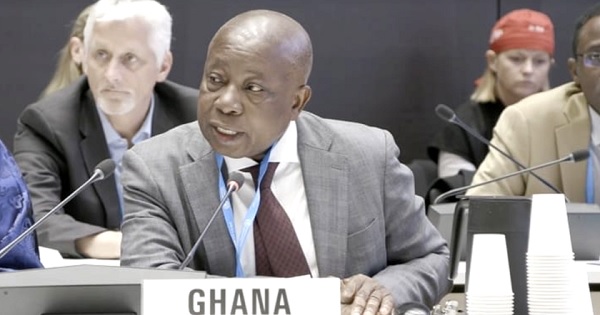
Africa needs global synergies to improve health — Agyeman-Manu
The Minister of Health, Kwaku Agyeman-Manu, has called for global synergies to help address Africa’s challenges regarding health investments, training and employment.
He said while the World Health Organisation (WHO) and the global community were discussing the protection of health investments and boosting health workforce with more emphasis on Africa, it was very important for stakeholders to appreciate that most African countries were saddled with challenges that required global support.
He was speaking at the fifth Global Forum on Human Resources for Health in Geneva.
“Everybody is talking about Africa.
Our country’s context is not that bleak but in some other African Countries, there is that challenge.
“Can we build global and regional synergies? Can we push some from one side to the other?
Can we put investments into areas lacking?
“ This is a problem that needs a global approach to resolve, I suspect that those holding the funds can do human resource capacity building across Africa, that will be helpful a lot in the global health workforce discussions,” Mr Agyeman-Manu emphasised.
Global Forum
The forum was held on the theme; “Protecting, safeguarding, and investing in the health and care workforce”.
It examined the required policy solutions, investments and multi-sectoral partnerships to address health and care workforce challenges and advance health systems towards universal health coverage and health security.
The outcomes will inform the United Nations General Assembly’s High-Level Meeting on UHC in September 2023.
The WHO is recommending that all countries increase the graduation of health personnel to reach 8 to 12 per cent of the active workforce per annum.
This means that a country with a total of 5000 physicians will need to graduate between 400 and 600 physicians each year to maintain and improve capacity in relation to population needs and health system demands.
Health work force, country situation
Mr Agyeman-Manu said around half of the world’s health workers experienced burnt-out during the COVID-19 pandemic, while 55 countries faced serious shortages of health workers – exacerbated by the poaching of skilled staff by wealthier countries.
“Many countries are struggling to retain health workers, ensure they are equitably distributed, ensure an adequate skills mix, and battling to mitigate their health workers mobility and migration.
However, citing the country’s situation, Mr Agyeman-Manu said the issue of training and employing health workforce was as bleak as it looked in other African countries because the country was producing a huge number of health workforce who were expecting the government to employ them.
“The challenge is that the health sector is attracting a lot of the over a million products of the government’s free Senior High School graduates because the country has an automatic recruitment policy in the health sector after health training.
“The government can no longer soak that anymore so how do we continue to train and keep them.
This is a challenge and these are things we may have to look at when discussing protecting health investments,” he said.
Applause
Mr Agyeman-Manu said although the country’s primary health system had been applauded globally, the country was not there yet.
“We all agree that more investments are required in the health workforce. We also need to protect health investments.
“The world is currently seeing inflation and low growth rate and the negative socio-economic impact of COVID-19,” he said.
He said the issue then was how individual countries and the global community could protect health investments as recommended in the face of all the challenges.
“If we continue to train without investments into facilities and scaling up equipment and all that, what would be the use of the workforce?” he querried.
He said during the COVID-19 active period, the country managed to recruit about 50, 000 plus additional health workers who were sitting in their homes doing nothing.
He said the number had been maintained but there still remained a huge backlog yet to be put on government payroll due to financial challenges.
The minister reiterated that health professionals in the country needed to upgrade themselves and improve their skills, hence the need to establish specialist colleges and introduce new programmes of specialisation that would be useful for the country.
Africa Charter
Mr Agyeman Manu appealed to global delegates to support the Africa Health Workforce Investment Charter, which Ghana spearheaded last year after COVID-19 exposed continental weaknesses.
The charter aims to align and stimulate investments to half the inequalities in access to health workers, especially in countries with the greatest shortages.
“The 5.3 million shortage comes amid 30 per centunemployment or underemployment among graduates,” said Mr Manu.
“We are also adversely impacted by unmanaged migration.
This is not just an African problem for Africa.
The world is interdependent, and we must act together.
“It is time for governments to show leadership in health workforce investments.
It is time for us to align and synergise efforts with all partners in prioritising health workforce investments.
It is time to walk the talk,” Mr Agyeman-Manu concluded, appealing for global support for the charter.
WHO response
The Director-General of the WHO, Dr Tedros Adhanom Ghebreyesus, in a response to the challenges, announced at the closing plenary that he would establish a multisectoral advisory group of experts that would provide him with the evidence for action in support of national health policy and workforce priorities.
“This advisory group will comprise government and partners with expertise in education, finance, gender, economy, health and labour, and will report to a WHO global policy group which will include me and the six regional directors,” he said
He said some of the key outcomes of the forum would be forwarded to the United Nations General Assembly’s High-Level Meetings on Universal Health Coverage and Pandemic Prevention, Preparedness and Response in September 2023.
Writer’s email: Doreen.andoh@graphic.com.gh

 Click the link to read your copy.
Click the link to read your copy.